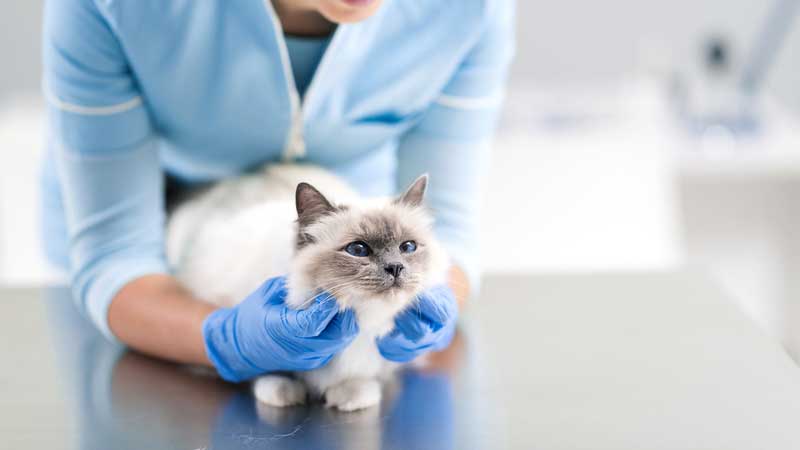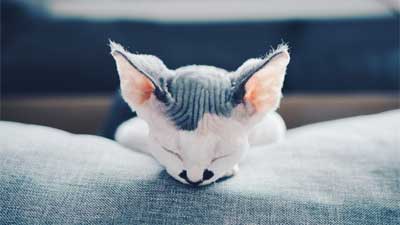Do Cats Carry The Feline Coronavirus For Life?

Best Answer:
Yes! The feline coronavirus is carried by cats for life.
Clinically, most cats will carry the coronavirus, but only a few cats will develop the disease, which is mainly related to the immunity of cats. When the cat's immunity is normal, the cat will not get sick, and when the immunity is low, there is a possibility of an outbreak of coronavirus infection. Feline coronaviruses are mostly secondary to severe stress, and even mutate, causing feline infectious peritonitis and threatening the health of cats.
Feline coronavirus (FCoV) is a positive-strand RNA virus, which is simply a genetic virus and a relatively common infectious disease, especially in kittens. It is transmitted through cat feces and is more common in households with many cats, such as cat houses, cat cafes, farms, etc., but this virus cannot be transmitted to humans or other viruses.
Cat coronavirus itself is incurable. Cat coronavirus will coexist with cats under normal conditions. If there is no special situation, cats will rely on their own immunity to fight against it, and most of them can live a stable life. Kittens carrying this type of virus are more likely to cause most gastroenteritis in daily life. In mild cases, it will not be life-threatening, but there is also a certain chance that it will mutate into the infectious peritonitis virus FIP. This probability is about 5%-10 %.
FIP can cause abdominal swelling in cats, which is commonly known as feline ascites. It is a cat disease with a high mortality rate and a high cost to cure. The reason for this disease is still unverifiable. It can only be said that the cat's immunity is lost in the confrontation with the virus. In addition to the decline in immunity caused by age, diet, and mood, stress and repeated infection also caused the mutation of the cat coronavirus.
What is Feline Coronavirus (FCoV)?
A prevalent viral infection in cats is the feline coronavirus (FCoV). However, it can also produce moderate diarrhea. It typically results in asymptomatic illness. Mutations from the virus as poorly known alterations can cause feline infectious peritonitis (FIP).
The majority of cats only temporarily shed the virus for a few months, but a small minority do so permanently. Following infection, most cats with an FCoV disease will recover from the virus, but some cats may continue to have an infection. These cats can shed significant amounts of virus in feces, are usually asymptomatic, and continuously infect other cats in the surroundings. A virulent FIP strain may more likely arise when FCoV is constantly circulated in a cat population.
Origin of Feline Coronavirus or FCoV
SARS-CoV2 and the feline coronavirus (FCoV) are the two coronaviruses that are responsible for COVID-19 and Feline Infectious Peritonitis (FIP), respectively. The feline coronavirus (FCoV) is entirely distinct from SARS-CoV2 and can not infect humans. However, SARS-CoV-2 can infrequently infect cats. Even though the virus that causes COVID-19 has only been found in a tiny number of cats and dogs globally.
What is FCoV and Its FIP Mutation?
In domestic cat populations worldwide, FCoV is a prevalent virus affecting even large cats in zoos. Infection is frequently asymptomatic or characterized by transitory gastrointestinal distress, including moderate diarrhea and vomiting in kittens and previously infected adult cats.
Feline infectious peritonitis (FIP), which is known to be a very deadly multisystemic disease, is thought to be caused by a more virulent mutation of FCoV. Young cats under the age of two are most often affected by the disease. FIP is a condition that affects cats, although it is not very prevalent, and once it strikes, the prognosis is nearly always catastrophic.
It is also unclear why some cats are almost asymptomatic while others develop FIP. The likelihood of developing FIP occurs whenever the FCoV infection exists. In the population of felines with FCoV infection, there is a 10% chance that FCoV may turn into FIP. Of all the cat diseases, FIP remains one of the least understood.
Cat Breeds That Are Susceptible to FIP
FIP may be more prone to develop in specific cat breeds. The Abyssinian, Bengal, Birman, Himalayan, Ragdoll, and Devon Rex are a few of these breeds.
Cats who live in multi-cat households, shelters, or catteries may be more likely to develop FIP. FIP risk may also be increased in cats who are stressed from rehoming, have recently undergone surgery, or have concomitant infections. It is also suspected that genetic factors have a significant role in the development of FIP.
How Do Cats Get Infected With The FCoV?
The fecal-oral pathway accounts for the majority of feline coronavirus infections in cats.
The virus is assumed to be shed in the feces of around one-third of these cats. It is thought that freezing conditions may keep the virus viable for months, even though it is weak and cannot survive for more than 24 to 36 hours in a typical environment. Only a matter of hours after contact, an infection will likely spread to clothing or other items.
References
- [1] ^ Cornell University College of Veterinary Medicine: Feline Coronavirus (FCoV) RT-PCR
- [2] ^ Shelter Medicine: Feline Infectious Peritonitis/Feline Coronavirus (FIP/FCoV)
You May Also Like
 Cat HealthWhat You Need to Know About Cat Incontinence
Cat HealthWhat You Need to Know About Cat Incontinence Cat HealthWhat Are The Symptoms Of Gastritis In Cats?
Cat HealthWhat Are The Symptoms Of Gastritis In Cats? Cat HealthHow To Take A Cats Temperature?
Cat HealthHow To Take A Cats Temperature? Cat HealthWhat Is The Normal Body Temperature Of A Cat?
Cat HealthWhat Is The Normal Body Temperature Of A Cat? Cat HealthHow Long Do Cats With Feline Idiopathic Cystitis Live?
Cat HealthHow Long Do Cats With Feline Idiopathic Cystitis Live? Cat HealthHow Can I Prevent Cystitis In My Cat?
Cat HealthHow Can I Prevent Cystitis In My Cat?